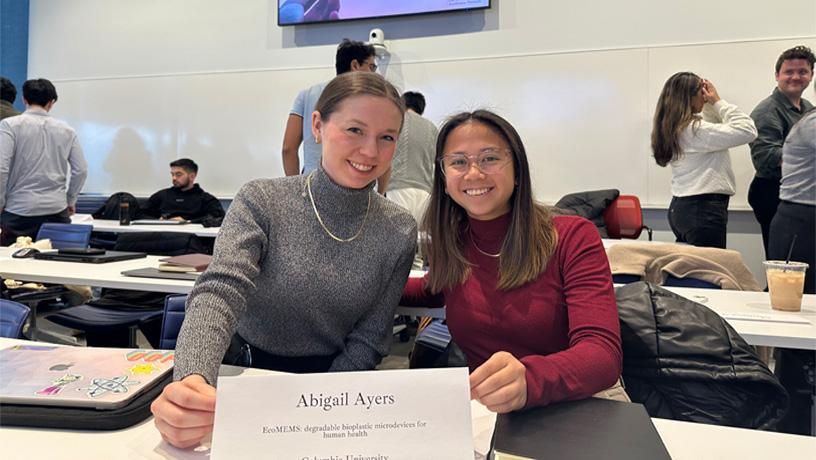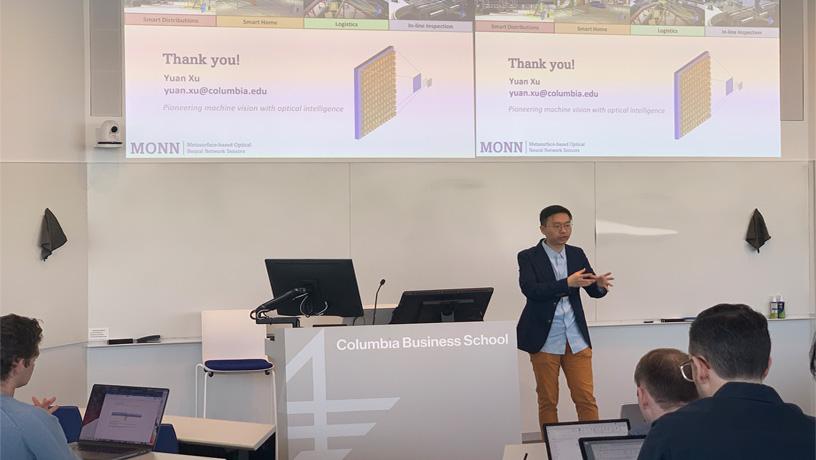Deep Tech Startups get a Boost
A new accelerator program and bootcamp helps fuel ideas for deep tech ventures

Columbia Engineering team EcoMEMS and members Abigail Ayers PhD‘25 (left) and Christia Victoriano PhD‘26 (right) at Materialize NY’s inaugural bootcamp
Columbia Engineering student teams this spring had an opportunity to advance their lab research into a deep tech startup, thanks to a new accelerator program designed for budding entrepreneurs.
As part of the new accelerator program, Materialize New York, student teams participated in a semester-long bootcamp that launched Jan. 24 at Columbia University's Manhattanville campus. The program is a new collaboration between the Lab-to-Market Accelerator Network, Columbia Technology Ventures, and Material Impact, a hands-on venture fund that builds deep tech companies powered by material-based approaches. The student teams worked with Material Impact on their entrepreneurial ventures that help solve meaningful challenges in industries including sustainability, robotics & AI/AR, and transportation and mobility. The accelerator program aims to advance the development of new technologies in the New York area from work that begins in the lab to establishing a start-up.
At an event held at Columbia Business School’s Kravis Hall, the senior vice dean of research and academic programs at Columbia Engineering, Garud Iyengar, gave opening remarks to the inaugural cohort of the Materialize NY Accelerator workshop.
“I'm really excited to be part of this kick-off event,” said Iyengar, professor of industrial engineering and operations research and now the director of Columbia’s Data Science Institute. “It's highlighting the depth and the excitement of deep tech in New York City.”
Of the 11 teams from schools and labs across the city, eight originated from Columbia Engineering and represented five departments. Other student teams participated from the City University of New York’s Advanced Science Research Center, New York University’s Polytechnic Institute, and Columbia University Graduate School of Arts and Sciences.
Over 14 weeks, teams participated in ten sessions led by Material Impact to learn what it takes to transform their research projects into a product that will address particular needs within specific market segments while learning the keys to a successful business framework. The Material Impact teaching team was assisted by four Columbia Business School students who were selected to serve as Venture Fellows for the program and worked closely with the participants to further tailor the learnings to each participating team.
“We were excited to work with the Materialize cohort on comprehensive frameworks and the foundational building blocks necessary for deep tech startups to succeed,” said Christian Theriault, a partner at Material Impact. “Through a combination of lectures and workshops, the participants developed an understanding of the key differences between the value of technical development, and the notion of a product's customer value propositions.”
At the end of the program on May 21, team members presented their final business strategy.
“The program's goal was to empower the teams to effectively navigate and gain a command of what is necessary vs sufficient when exploring customers discovery, monetization strategies, and technical requirements," Theriault said.

Second place winner Yuan Xu of Metasurface-based Optical Neural Networks (MONN), a Columbia Engineering team representing the Department of Applied Physics and Applied Mathematics
Metasurface-based Optical Neural Networks (MONN), led by Yuan Xu PhD‘26, was declared second place winner. Originating from Columbia Engineering’s applied physics and applied mathematics department, MONN Integrates photonics with AI to create low-cost, ultra-compact systems for optical neural network computing and sensing. Their system aims to ensure higher resolution images could be processed at a fraction of the cost. The first place winner was CUNY’s BioWraptor, which revolutionized diagnostic reliability and accessibility with protein stability.
Overall, teams learned a valuable lesson: how to translate complex engineering challenges into coherent, monetizable business solutions.
